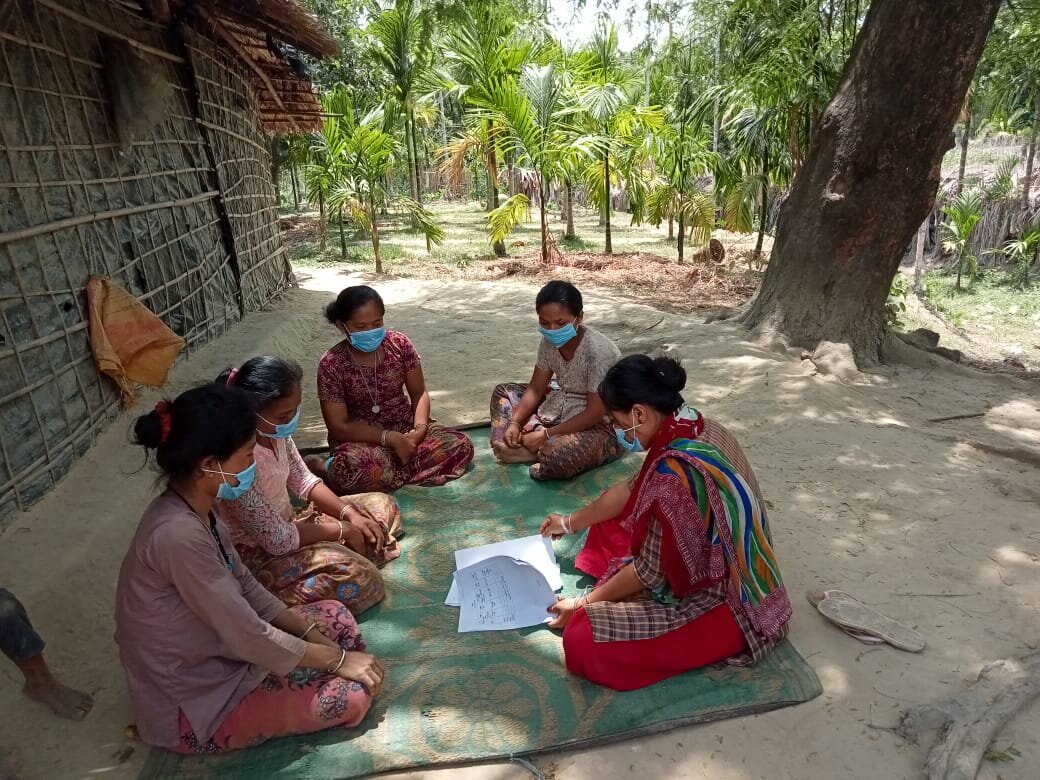Indigenous youth leaders educating the next generation in Bangladesh
Above: Chakma community education facilitators have shifted to making individual home visits while COVID-19 restrictions are in place. Photo: Rokshana Jahan/FIVDB
The Chakma are the largest Indigenous group in eastern Bangladesh’s Chittagong Hill Tracts, home to around 300,000 people.
Chakma people are hardworking, mostly providing for their families through subsistence agriculture. But a lack of educational institutions in the community means most Chakma are illiterate or only semi-literate. Language is a major barrier when it comes to education, as the Chakma speak their own language, which uses its own script, while most formal education is carried out in Bengali or English.
Not far from the Chittagong Hill Tracts lies Kutapalong, the world’s largest displaced persons camp, where more than 750,000 Rohingya Muslims fled in 2017 after facing violence and persecution in Myanmar.
As part of the Australian Humanitarian Partnership (AHP) response in Bangladesh, which focuses on host communities as well as those displaced by conflict, efforts are being made to increase opportunities for Chakma youth to access education.
This work is being driven by passionate community members like Kajol and Keching Chakma, with the support of AHP partners Friends in Village Development Bangladesh in collaboration with Plan International Bangladesh.
Above: An early childhood education facilitator runs a caregivers’ small group session in a Chakma community. Photo: Rokshana Jahan/FIVDB
The NGOs have established two early childhood education centres, known locally as Shishu Bikash Kendra or SBKs, and an Adolescent and Youth Club in Teknaf, Cox's Bazar. The centres opened in February 2021. Activities at the centres have been temporarily replaced by community outreach work while a COVID-19 lockdown is in place.
Kajol, a student in 10th grade, works as a facilitator at the Sunflower SBK, teaching 22 children ages 3-5, six days a week. She teaches the children how to greet others, how to say their name, and how to recite poems and rhymes. She plays indoor and outdoor games with them and helps them make their own toys with materials that are readily available in the local area. She also takes part in caregiver sessions with the parents of the children twice a week.
Despite the recent COVID-19 lockdown in the area, Kanjol continued her work, making individual home visits to the children when they couldn’t meet for classes.
Keching, a high school graduate who works as a facilitator at the Shiuli SBK, is also motivated to make a difference for Chakma children through education. On top of his work with early childhood classes, Keching also provides support at the Adolescent and Youth Club, where illiterate and semi-literate youth can learn reading, writing, arithmetic, and various life skills that will help them in the future.
Above: An outdoor class for Chakma children run by an early childhood education facilitator. Photo: Rokshana Jahan/FIVDB
As a Chakma, Kajol says she is motivated to make sure the next generation of children to feel more connected to wider Bangladeshi life and society and have access to opportunities.
"All my life I have seen my people as different because we do not speak the language of the common people of Bangladesh, we do not look like them, so we do not fit in,” Kajol said.
“Then I realised that maybe these things make us different, but if we all have the same education, we are all the same.”
The AHP Bangladesh response, supported by the Australian Government, is now in its third phase. It is led by a consortium of Australian NGOs -- CAN DO, CARE Australia, Plan Australia, Oxfam Australia, Save the Children Australia and World Vision Australia -- in coordination with their local partners.



